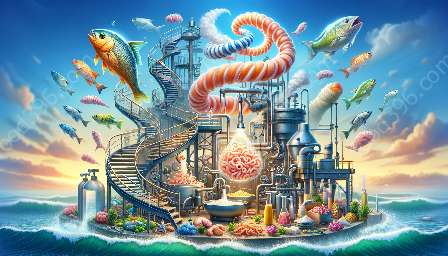Seafood processing generates a significant amount of by-products, which can be utilized through various recovery technologies. By maximizing the utilization and implementing efficient waste management practices, the seafood industry can contribute to sustainable resource use and environmental conservation. This article explores the innovative by-product recovery technologies in seafood processing and their role in the larger context of seafood by-product utilization and waste management within the framework of seafood science.
Understanding Seafood Processing By-Products
Before delving into by-product recovery technologies, it's essential to understand the nature of by-products generated in seafood processing. These by-products encompass a wide range of materials, including fish heads, skins, bones, viscera, and scales. While traditionally considered as waste, these by-products contain valuable nutrients, proteins, fats, and bioactive compounds that can be utilized in various applications, such as food, pharmaceuticals, and nutraceuticals.
The Importance of Recovery Technologies
By-product recovery technologies play a crucial role in extracting the valuable components from seafood processing by-products, thereby minimizing waste and maximizing resource utilization. These technologies involve advanced processes such as enzymatic hydrolysis, protein extraction, lipid recovery, and chitin/chitosan extraction. Additionally, innovative techniques like supercritical fluid extraction, membrane separation, and biorefinery concepts have emerged as sustainable approaches for recovering valuable compounds from seafood by-products.
Sustainable Utilization and Waste Management
The integration of recovery technologies with sustainable utilization practices is pivotal for the seafood industry's ecosystem approach to fisheries and waste management. Utilizing by-products in value-added products like fish oil, fish protein hydrolysates, and chitin-based products aligns with the principles of circular economy and sustainable resource use. Furthermore, effective waste management strategies, such as bioremediation, composting, and anaerobic digestion, can mitigate the environmental impact of seafood processing waste.
Advancements in Seafood By-Product Utilization
Continual research and development in seafood by-product utilization have led to the expansion of product portfolios, including nutraceuticals, dietary supplements, functional foods, and animal feed. The application of by-products in pharmaceutical formulations, wound healing materials, and antimicrobial agents demonstrates the diverse potential of seafood processing by-products beyond the traditional food industry.
Role of Seafood Science
Seafood science plays a pivotal role in understanding the biochemical composition and functional properties of seafood processing by-products, thereby enabling the development of targeted recovery technologies and utilization strategies. The interdisciplinary nature of seafood science encompasses food technology, biochemistry, sustainability, and waste management, providing a holistic approach to addressing the challenges and opportunities in seafood processing and by-product utilization.
Conclusion
By-product recovery technologies in seafood processing are critical for harnessing the potential of seafood processing by-products in a sustainable and economically viable manner. The adoption of innovative recovery technologies, coupled with efficient utilization and waste management practices, can contribute to the development of a circular and resource-efficient seafood industry. Furthermore, the integration of these technologies within the realm of seafood science fosters a comprehensive understanding of the by-product utilization and waste management processes, paving the way for a more sustainable and environmentally conscious seafood industry.

